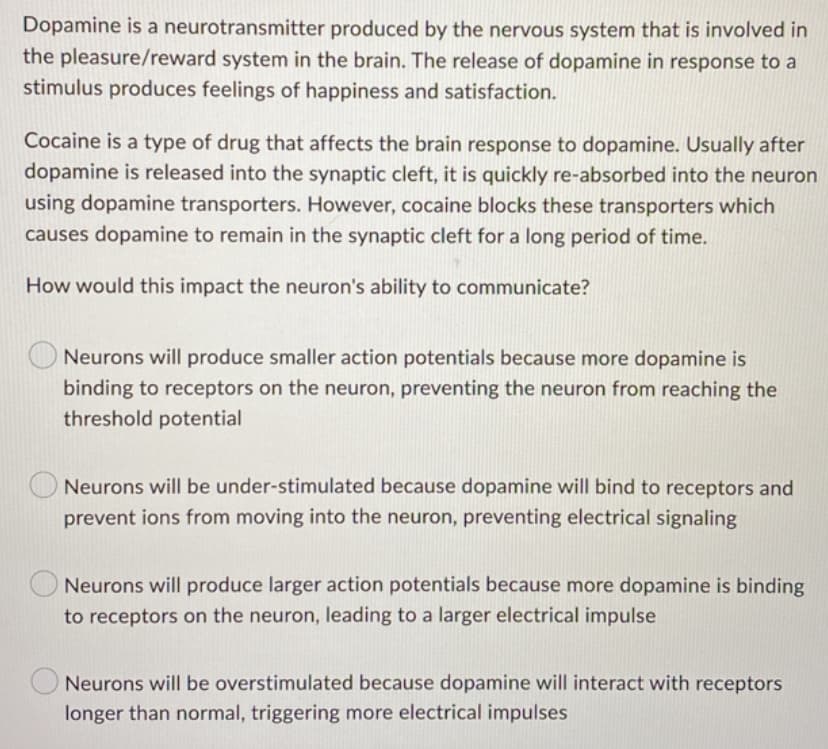Dopamine is a neurotransmitter produced by the nervous system that is involved in the pleasure/reward system in the brain. The release of dopamine in response to a stimulus produces feelings of happiness and satisfaction. Cocaine is a type of drug that affects the brain response to dopamine. Usually after dopamine is released into the synaptic cleft, it is quickly re-absorbed into the neuron using dopamine transporters. However, cocaine blocks these transporters which causes dopamine to remain in the synaptic cleft for a long period of time. How would this impact the neuron's ability to communicate? Neurons will produce smaller action potentials because more dopamine is binding to receptors on the neuron, preventing the neuron from reaching the threshold potential Neurons will be under-stimulated because dopamine will bind to receptors and prevent ions from moving into the neuron, preventing electrical signaling Neurons will produce larger action potentials because more dopamine is binding to receptors on the neuron, leading to a larger electrical impulse Neurons will be overstimulated because dopamine will interact with receptors longer than normal, triggering more electrical impulses
Dopamine is a neurotransmitter produced by the nervous system that is involved in the pleasure/reward system in the brain. The release of dopamine in response to a stimulus produces feelings of happiness and satisfaction. Cocaine is a type of drug that affects the brain response to dopamine. Usually after dopamine is released into the synaptic cleft, it is quickly re-absorbed into the neuron using dopamine transporters. However, cocaine blocks these transporters which causes dopamine to remain in the synaptic cleft for a long period of time. How would this impact the neuron's ability to communicate? Neurons will produce smaller action potentials because more dopamine is binding to receptors on the neuron, preventing the neuron from reaching the threshold potential Neurons will be under-stimulated because dopamine will bind to receptors and prevent ions from moving into the neuron, preventing electrical signaling Neurons will produce larger action potentials because more dopamine is binding to receptors on the neuron, leading to a larger electrical impulse Neurons will be overstimulated because dopamine will interact with receptors longer than normal, triggering more electrical impulses
Anatomy & Physiology
1st Edition
ISBN:9781938168130
Author:Kelly A. Young, James A. Wise, Peter DeSaix, Dean H. Kruse, Brandon Poe, Eddie Johnson, Jody E. Johnson, Oksana Korol, J. Gordon Betts, Mark Womble
Publisher:Kelly A. Young, James A. Wise, Peter DeSaix, Dean H. Kruse, Brandon Poe, Eddie Johnson, Jody E. Johnson, Oksana Korol, J. Gordon Betts, Mark Womble
Chapter12: The Nervous System And Nervous Tissue
Section: Chapter Questions
Problem 8ILQ: Watch this video (http://openstaxcollege.org/l/neurotrans) to learn about the release of a...
Related questions
Question

Transcribed Image Text:Dopamine is a neurotransmitter produced by the nervous system that is involved in
the pleasure/reward system in the brain. The release of dopamine in response to a
stimulus produces feelings of happiness and satisfaction.
Cocaine is a type of drug that affects the brain response to dopamine. Usually after
dopamine is released into the synaptic cleft, it is quickly re-absorbed into the neuron
using dopamine transporters. However, cocaine blocks these transporters which
causes dopamine to remain in the synaptic cleft for a long period of time.
How would this impact the neuron's ability to communicate?
Neurons will produce smaller action potentials because more dopamine is
binding to receptors on the neuron, preventing the neuron from reaching the
threshold potential
Neurons will be under-stimulated because dopamine will bind to receptors and
prevent ions from moving into the neuron, preventing electrical signaling
Neurons will produce larger action potentials because more dopamine is binding
to receptors on the neuron, leading to a larger electrical impulse
Neurons will be overstimulated because dopamine will interact with receptors
longer than normal, triggering more electrical impulses
Expert Solution
This question has been solved!
Explore an expertly crafted, step-by-step solution for a thorough understanding of key concepts.
Step by step
Solved in 2 steps

Knowledge Booster
Learn more about
Need a deep-dive on the concept behind this application? Look no further. Learn more about this topic, biology and related others by exploring similar questions and additional content below.Recommended textbooks for you

Anatomy & Physiology
Biology
ISBN:
9781938168130
Author:
Kelly A. Young, James A. Wise, Peter DeSaix, Dean H. Kruse, Brandon Poe, Eddie Johnson, Jody E. Johnson, Oksana Korol, J. Gordon Betts, Mark Womble
Publisher:
OpenStax College


Human Physiology: From Cells to Systems (MindTap …
Biology
ISBN:
9781285866932
Author:
Lauralee Sherwood
Publisher:
Cengage Learning

Anatomy & Physiology
Biology
ISBN:
9781938168130
Author:
Kelly A. Young, James A. Wise, Peter DeSaix, Dean H. Kruse, Brandon Poe, Eddie Johnson, Jody E. Johnson, Oksana Korol, J. Gordon Betts, Mark Womble
Publisher:
OpenStax College


Human Physiology: From Cells to Systems (MindTap …
Biology
ISBN:
9781285866932
Author:
Lauralee Sherwood
Publisher:
Cengage Learning

Human Biology (MindTap Course List)
Biology
ISBN:
9781305112100
Author:
Cecie Starr, Beverly McMillan
Publisher:
Cengage Learning